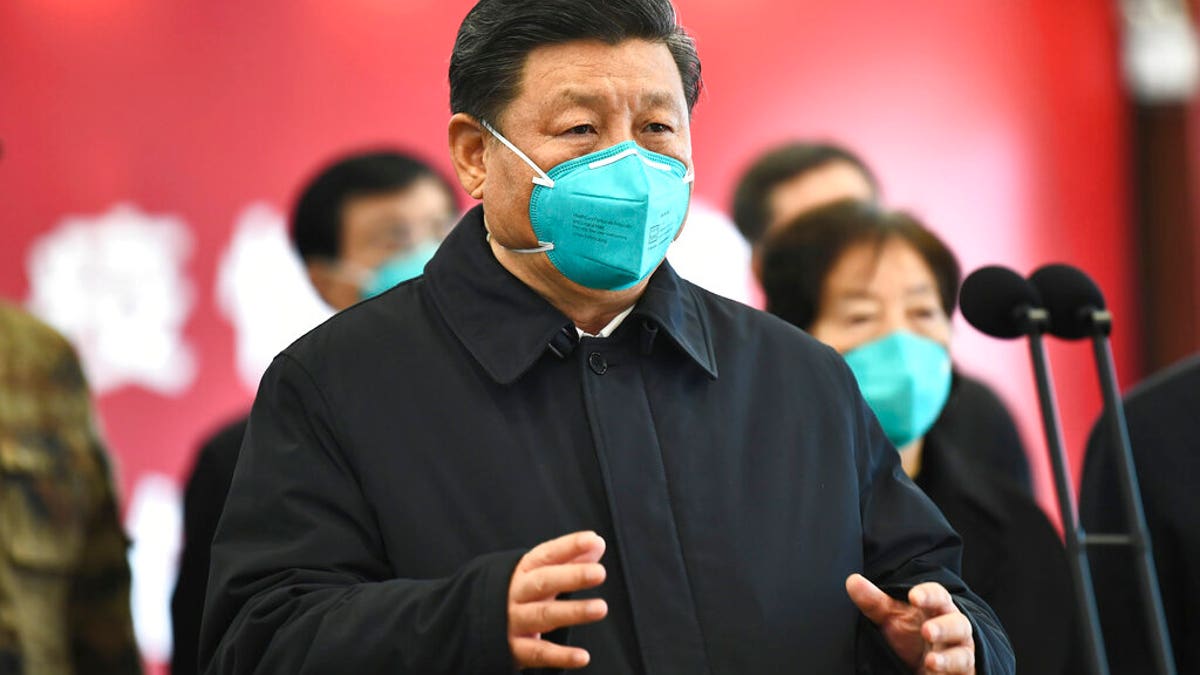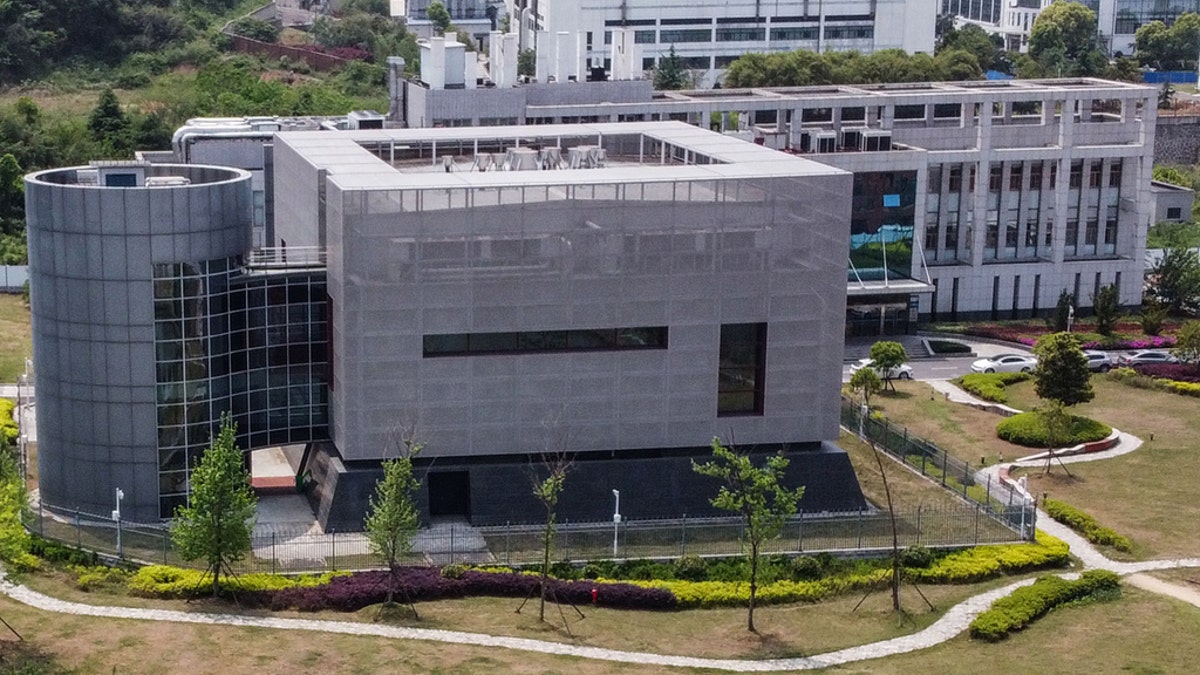COVID-19 origins: China continues to deny foreign access to Wuhan lab
New details about efforts to find out how the coronavirus pandemic began; Gillian Turner reports.
Get all the latest news on coronavirus and more delivered daily to your inbox. Sign up here.
Federal officials are pressing one of the most advanced biocontainment laboratories in the U.S. to reveal more information relating to their extensive work and contractual relationship with the Wuhan Institute of Virology, a new letter from the Department of Education reveals.
The letter, dated April 24 and addressed to the University of Texas chancellor James Milliken, asks explicitly for disclosures as required under section 117 of the Higher Education Act.
"Between June 6, 2014, and June 3, 2019, U.T. reported approximately twenty-four contracts with various Chinese state-owned universities and ten contracts with Huawei Technologies, all purportedly worth a reported total of $12,987,896," the letter, signed by Reed D. Rubinstein, principal deputy general counsel for the U.S. Department of Education, states. "It is not clear, however, whether U.T. has, in fact, reported all gifts from or contracts with or relating to the Wuhan MCL, the Wuhan Institute of Virology, and/or all other foreign sources, including agents and instrumentalities of the government of the Peoples' Republic of China."
CLICK HERE FOR COMPLETE CORONAVIRUS COVERAGE
"Therefore, to verify U.T.'s compliance with Section 117, the Department requests that your Institution produce the following records within thirty (30) days. Unless otherwise noted, the relevant time frame for these requests is January 1, 2012, through the present," the letter continues.
The GNL, which is part of the University of Texas system, is one of just 14 biosafety level 4 labs in the U.S.
The 2018 agreement provided for the exchange of some of America's most talented research and national security scientists, in addition to wide-ranging research sharing — an arrangement that experts say poses serious national security risks, especially considering the Wuhan lab's burgeoning scrutiny and linkage to the coronavirus pandemic, formally termed COVID-19.
CHINA UPS ITS SPY GAME ON US SOIL AS IT BIDS TO CONTROL CORONAVIRUS NARRATIVE
According to some national security and geopolitical experts, this flags a cause for steep concern and represents a larger piece of a problematic puzzle.
"The academic and research exchanges that have opened up more widely with China [have] reached a tipping point. Beijing [is] exploiting our open system with our help," said Patrick Cronin, Asia-Pacific security chair for the Hudson Institute. "Universities provided unguarded access to sensitive if unclassified data; American research institutions became hubs for information collection and the recruitment of spies; and universities with large numbers of Chinese students engaged in self-censorship lest they offend the Chinese government."

In this Tuesday, March 10, 2020, photo released by China's Xinhua News Agency, Chinese President Xi Jinping talks by video with patients and medical workers at the Huoshenshan Hospital in Wuhan in central China's Hubei Province. (Xinhua via AP)
The Galveston National Laboratory (GNL) boasted in a 2018 release about its work in directing operations of the Wuhan Institute of Virology, with the release reading: "In preparation for the opening of the new China MCL, we engaged in short- and long-term personnel exchanges focused on biosafety training, building operations and maintenance, and collaborative scientific investigations in biocontainment. We succeeded in transferring proven best practices to the new Wuhan facility."
Specifically, the Department of Education also asks for records and communications with famed Chinese virologist Shi Zhengli, the so-called "Batwoman" researcher at the Wuhan Institute.
As it stands, the U.S. government is conducting a comprehensive investigation into whether or not the novel pathogen, borne out of the Chinese city of Wuhan late last year, stemmed from a laboratory or a wet market as the Communist Party (CCP) leadership initially claimed.
The letter affirms that the investigation into U.T.'s China relations is being directed by the Department's Office of the General Counsel and cautions that the Department "recognizes that the COVID-19 virus may have a significant impact on certain U.T. operations. Nonetheless, the critical importance of the Department's investigation into the accuracy of U.T.'s foreign source reporting with respect to the Wuhan MCL and other Chinese Communist Party-related persons and entities is not diminished."
In a statement issued to Fox News late Friday afternoon, the University of Texas insisted that "each of the institutions within the UT System is required to complete and submit documentation annually to the Department of Education reporting gift and contract relationships with foreign entities, and UT institutions comply with these obligations.
"We will continue to respond to any request from state and federal authorities, should they arise. As one of the nation’s 14 Bio Safety Level 4 laboratories, the Galveston National Laboratory at UTMB belongs to the National Institute of Allergy and Infectious Diseases (NIAID) Biodefense Laboratory Network. It has collaborated with more than 70 countries and with scientists from the U.S. and abroad on biosafety and biosecurity, as part of its broad mission to advance global scientific collaboration," the statement continued. "While it receives no financial support or gifts from global scientific laboratories, UTMB complies with obligations to report fiduciary relationships as required by statute."
This is not the first red flag raised when it comes to the relationship between U.S. universities and China.
In November 2016, it was reported that research partnerships between U.S. and Chinese scientists had surged significantly, with collaborations between the two economic leaders outnumbering all other international alliances.
"Increased collaboration between the United States and China is consistent with a general trend toward greater cross-border collaboration in science globally; however, the data also show a heavier reliance on bilateral collaboration with one another than with any other single country," noted Stephane Segal, a political economist at the Center for Strategic and International Studies (CSIS). "At the same time, the U.S. intelligence community has accused China of exploiting scientific collaboration and 'stealing innovation.'"
By 2018, it had become something of a cause for concern. In August that year, the director of the federal government's National Institutes of Health (NIH), Francis Collins, sent warnings to more than 10,000 academic institutions regarding threats from foreign entitles to biomedical research in the U.S.

An aerial view shows the P4 laboratory at the Wuhan Institute of Virology in Wuhan in China's central Hubei province on April 17, 2020. - The P4 epidemiological laboratory was built in co-operation with French bio-industrial firm Institut Merieux and the Chinese Academy of Sciences. The facility is among a handful of labs around the world cleared to handle Class 4 pathogens (P4) - dangerous viruses that pose a high risk of person-to-person transmission. (AFP via Getty)
According to The Scientist, this was followed "by a subsequent wave of letters to a smaller number of universities requesting information about specific faculty members with potential links to foreign governments," prompting several scientists to leave their positions after being flagged for "undisclosed connections to China" and failing to report Chinese funding for projects.
In April of last year, NIH officials informed lawmakers that a further 16 investigations were underway, with regards to hidden influences of foreign governments on federal grant applications.
However, the concern continued throughout last year. In November, a U.S. Senate panel report pertaining to China's efforts to permeate U.S. research institutions lamented that the slow response from science agencies to warnings had allowed the CCP to divert U.S. government funds and private-sector technology to strengthen its economic and military ambitions.
The analysis cast scrutiny on China's Thousand Talents Plan, an illustrious program tailored to recruit leading academics and promote domestic research. The contracts signed for the plan, to the ire of lawmakers and federal officials, mandated that "participating scientists abide by Chinese law, keep the contract secret, recruit postdocs and sign over any intellectual property rights to the sponsoring Chinese institution."
According to concerned lawmakers, the contracts thus offer incentives for scientists to set up "shadow labs" in China that emulate U.S. taxpayer-funded research at their home institutions.
CLICK HERE TO GET THE FOX NEWS APP
But with the novel coronavirus having claimed more than 60,000 lives in the United States alone, the Wuhan-U.S. academia trail is now being met with an even more discerning eye from Washington.
"The scope of China's exploitation of our open universities, including medical, biology, and other scientific labs, is only recently coming into focus," Cronin added. "At the end of 2019, the FBI and the NIH announced they were investigating 180 separate cases involving more than 70 institutions
"In almost all cases, the alleged theft of biomedical research information was done by Chinese citizens or Americans of Chinese descent. Bit by bit, China found ways into government scientific labs."

